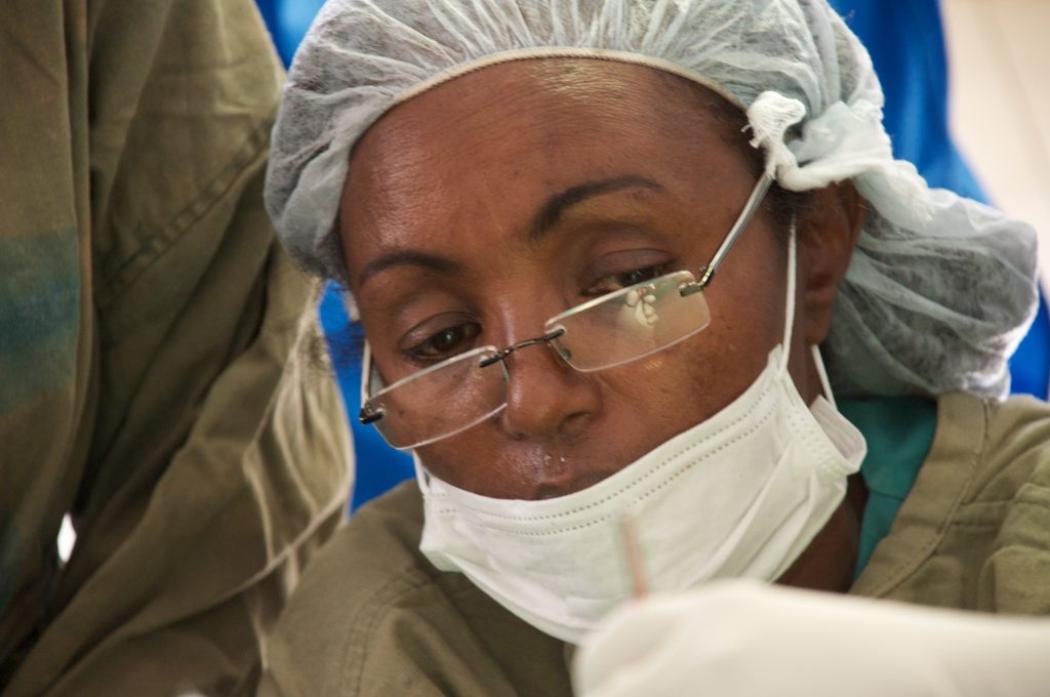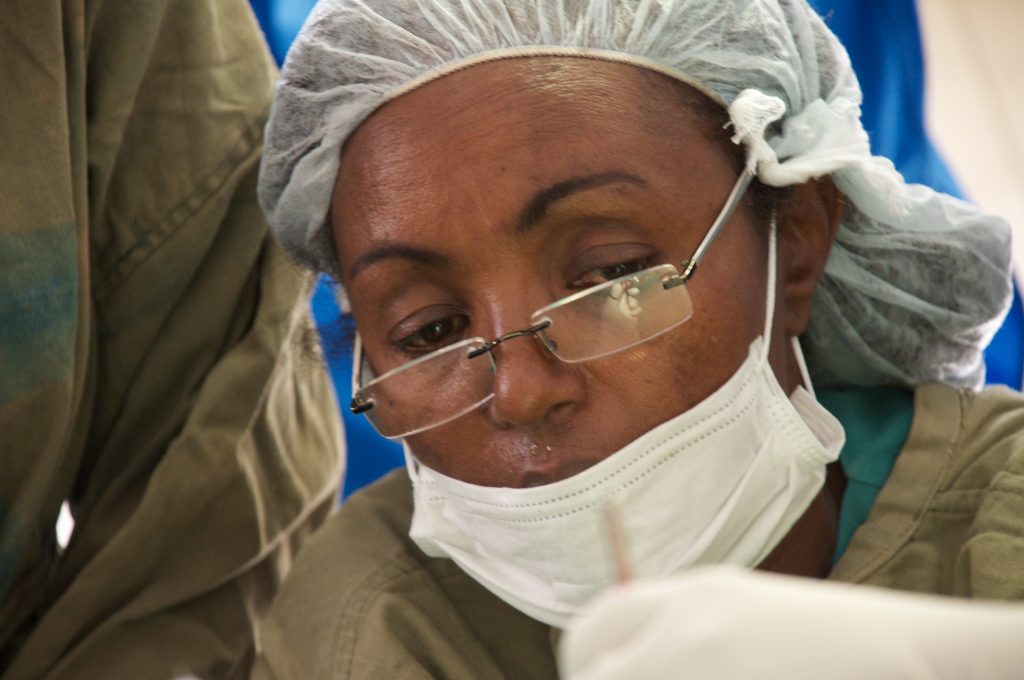Access to safe and affordable surgical and anesthesia care when needed: A global promise that must be fulfilled

Dr. Mulu Maleta performs fistula surgery at Gondar Fistula Hospital in Gondar, Ethiopia. Courtesy of Johnson & Johnson.
By Dr. Ross “Rusty” Segan, Johnson & Johnson
A surgical colleague of mine once offered a hypothesis to his group of eager medical students: everyone lives in at least one of three states - pre-op, intra-op and post-op.
At first, I thought this was simply an attempt to grab the attention of these young men and women, but over the last several years I’ve come to appreciate the wisdom of this statement. We inhabit this earth with approximately 7 billion fellow humans, of which as many as 5 billion lack access to safe and affordable anesthesia and surgical care. With approximately 28-32% of the world’s global burden of disease being potentially addressable through surgery, lack of access to surgery represents the single largest aggregate global public health challenge in the world today. Considering the range of surgically treatable conditions – appendicitis, hernia, cholecystitis, malignancy, obstructed labor, maternal hemorrhage, open fracture, trauma, cleft lip, club foot, hydrocephalus, and cataract – it is easy to see the possible broad impact of everyone having access to surgery for these conditions alone.
Although this problem has been known in many circles, only in the past few years has it grabbed mainstream attention. Perhaps the most impactful contributors to the elevation of Surgery to the forefront in Global Public Health were the 2015 publication of DCP3 Volume 1-Essential Surgery and the special report of the Lancet Commission on Global Surgery, entitled “Global Surgery 2030: evidence and solutions for achieving health, welfare and economic development.” Both clearly articulate the global surgery access story, the magnitude of the challenge, what we know about scalable interventions and the economics of surgery.

Dr. Mulu Maleta performs fistula surgery at Gondar Fistula Hospital in Gondar, Ethiopia. Courtesy of Johnson & Johnson.
Despite the incredible unmet need, solves for surgical access have proven elusive, largely due to the complexity of the surgical ecosystem. In low and middle income countries, this ecosystem is a network of varying degrees of connection between frontline health workers, local clinics, a first-level district hospital (the core facility for essential surgical procedures) and a tertiary medical center.
Within this ecosystem, having a health worker with the right training, equipment and resources is, insufficient to meet needs. Patients need to have physical access to care, reasonable assurance of quality of care and be able to afford that care. Within many countries, frontline health workers are crucial to the identification of patients with surgically treatable conditions, referral for care, and assistance during post-operative care. One of the most clear recommendations from the Lancet Commission, is that solutions are most likely to be successful if they are part of a coalition supporting a country-level national surgical plan with targeted policies and actions that address: infrastructure, workforce, care delivery, finance and information management.
Frontline health workers are a cornerstone of any credible national surgical plan. To illustrate this, let’s walk down the road of a patient with obstetric fistula. Obstetric fistula is a complication of a usually prolonged labor and unassisted childbirth, which is often physically, emotionally and socially unbearable for the women themselves and/or their families. These women and their children are often marginalized, ostracized and abandoned.
Any tangible sense of normalcy, positive self-worth and role in the community is threatened the minute this complication occurs. The road to healing is long and challenging, but comprehensive programs, including the Fistula Foundation, UNFPA, and the Campaign to End Fistula, have led to successful outcomes for these women.
And it is clear that the role of the frontline health worker is critical, not only to treating these complications and road to recovery, but to preventing them:
- Empowerment of girls and young women with the education to delay pregnancy until maturity may help decrease the risk;
- The majority of fistulae occur due to prolonged or obstructed labor. Increasing the presence and access of women to skilled birth attendants and midwives, as well as surgical c-section, can help reduce the likelihood of fistula;
- Appropriate prenatal care and identification and repair of birth trauma at the time of delivery;
- Early identification of fistula in the community by trained individuals with knowledge of fistula and where to seek help;
- Referral to safe, qualified surgical care; and
- Post-operative rehabilitation and community reintegration.
At every stage, the frontline health worker plays a vital part in this preventable and surgically addressable condition.
As I reflect on the work of the Lancet Commission and DCP3 along with the journeys patients will follow along their pre-op, intra-op and post-operative care, I appreciate just how integral surgery is to any reasonably functioning healthcare system.
At the inaugural Lancet Commission Meeting, Jim Kim, President of the World Bank aptly stated, “Surgery is an indivisible, indispensable part of healthcare” and “can help millions of people live healthier, more productive lives.”
The increased awareness and advocacy led to a passage of the World Health Assembly Resolution WHA 68/15 to strengthen emergency and essential surgical care and anesthesia as a component of universal health coverage – a meaningful first global step in a promise to provide broader access.
With frontline health workers being such a critical part of solving this challenge, I am hopeful we will keep this promise.
